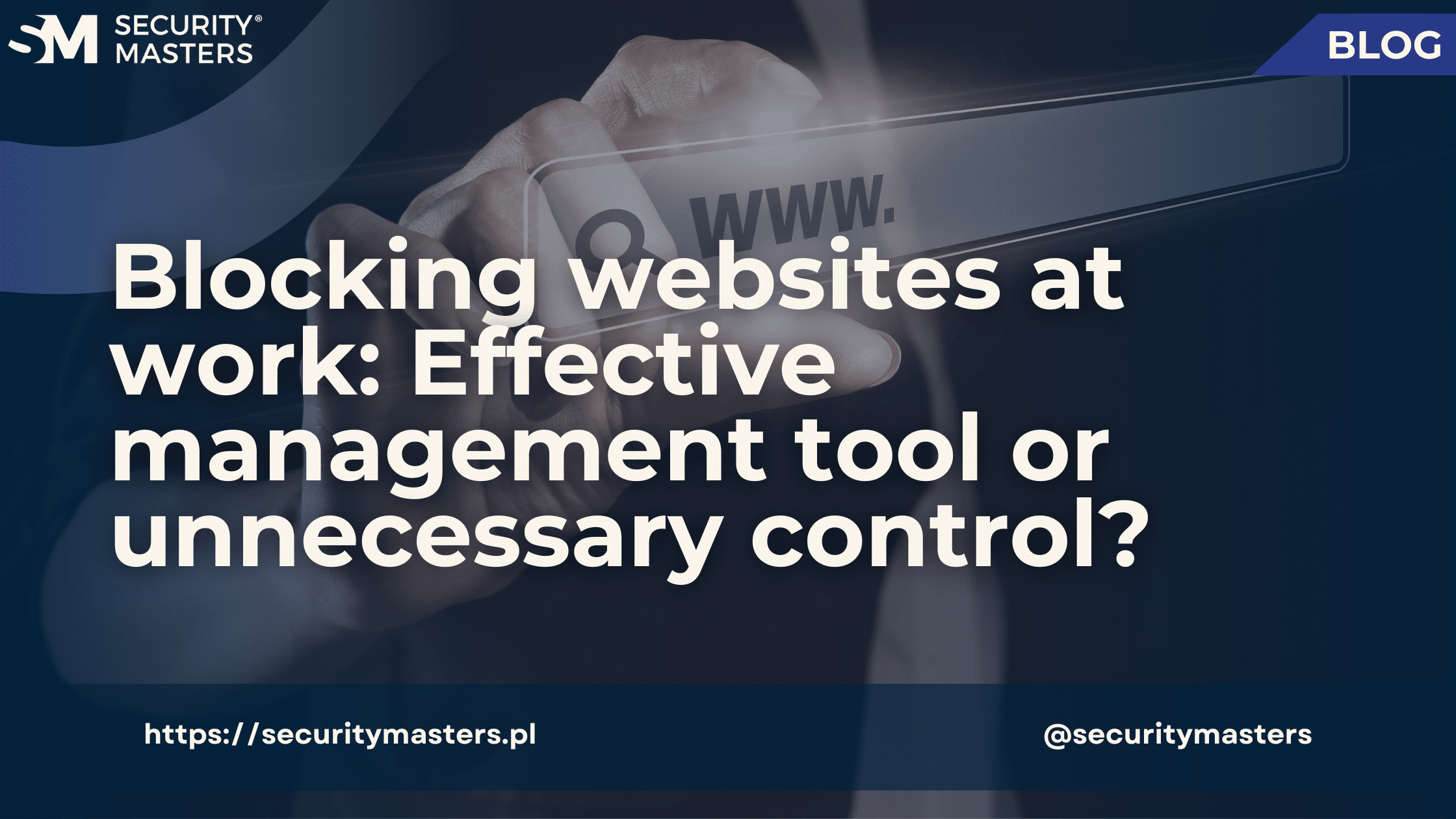Blocking websites at work: Effective management tool or unnecessary control?
Companies are increasingly considering implementing restrictions, hoping for greater employee focus and improved data security. However, there are no easy answers. Surprisingly, blocking access to specific websites can benefit a business, but if poorly executed, it can create more problems than it solves.
This article dives into why companies block websites, what technologies can be leveraged, and what the real effects of such actions are. You’ll find an analysis of how blocking impacts data security, as well as examples where restrictions may negatively affect team morale.
Why do companies block websites?
Blocking websites at the workplace is usually intended to boost work efficiency, protect against digital threats, and secure sensitive data. Here are the main reasons companies implement website blocking policies:
Main reasons companies implement website blocking policies:
- Increasing productivity – Sites like social media and streaming platforms can be major distractions. Studies show that an average employee spends up to 2 hours daily on non-work-related websites, significantly affecting productivity.
- Protection against cyber threats – Websites containing adult content, gambling, or other suspicious materials are often sources of hacking attempts and malware that can infect a company’s internal network.
- Managing network bandwidth – Many companies have limited network resources, and accessing websites with large multimedia files can clog the network, slowing down data flow and impacting the work of other users.
- Reputation management – Certain online activities, especially those involving political, social, or controversial opinions, can expose the company to criticism and damage its public image. Blocking access to sensitive websites helps manage corporate reputation.
Technical solutions for website blocking in companies
Employers can choose from various tools and methods for blocking internet access, tailored to the company’s needs and operations. Here are the most common solutions:
- Corporate firewalls – These devices filter network traffic, allowing administrators to block access to specific URLs. Firewalls enable the creation of lists of allowed and blocked websites, providing precise internet access control.
- Web filtering software – Tools like Barracuda or Cisco Umbrella monitor and control internet traffic in real-time. These systems block website categories and offer reporting features to track user activity.
- Browser-level controls – Extensions installed in browsers can limit access to websites on the user level. This option is easy to implement but less effective since it requires user cooperation.
- DLP (Data Loss Prevention) systems – These systems prevent data leaks and unauthorized access to certain content while monitoring user activity. DLP not only safeguards data but also provides control over internet use.
Impact of website blocking on productivity and employee morale
Does blocking websites actually increase productivity? In many cases, yes, but the effectiveness of this method depends on the nature of the work and employee attitudes. Here are a few factors to consider:
- Intrinsic motivation vs. external control – Research indicates that employees monitored through blocking tools often feel less free and less engaged in their tasks. External restrictions can undermine intrinsic motivation, paradoxically reducing productivity.
- Creativity and breaks – Employees in creative roles sometimes need a short break to browse online content unrelated to work, which can stimulate their creativity and improve focus. Overly strict website blocking may hinder this process.
- Stress management – Being able to check messages or quickly browse social media during a break can help reduce stress. Excessive restrictions can lead to frustration and lower employee morale.
- Supervision vs. trust – Implementing strict website blocking policies may be perceived as a lack of trust from the employer, affecting company culture and internal relationships. Employees value companies that give them the freedom to manage their own time without excessive restrictions.
Recommendations: How to effectively manage internet access
Website blocking should be tailored to the work environment and organizational culture. Here are some recommendations to help companies manage internet access effectively:
- Implement flexible policies – Instead of globally blocking websites, companies can restrict access for specific departments or during working hours. For instance, the marketing department may need access to social media, whereas other departments may not.
- Employee education and training – Rather than solely relying on blocking websites, invest in educating employees about online security and productivity. Many people are unaware of the risks of visiting non-work-related websites or how it affects efficiency.
- Develop an internet usage policy – Clear rules and procedures for internet use in the workplace can help prevent misuse. The policy should outline allowed and blocked sites, as well as the consequences of non-compliance.
- Regular audits and effectiveness analysis – Website blocking should be regularly reviewed to ensure it genuinely supports work efficiency. Audits can help identify issues and make necessary adjustments.
- Use monitoring tools instead of blanket blocking – Instead of blocking all websites, employers can monitor internet activity to gather data on usage without imposing strict limitations. This information can be helpful for analysis and potential policy updates.

Conclusion:
Website blocking is a nuanced issue that requires a thoughtful strategy and adaptation to organizational needs. While restricting access to certain content can boost productivity and protect against cyber threats, excessive control can harm morale, foster frustration, and lower employee engagement. Modern internet access management calls for flexibility, transparency, and supporting employees through training and education.
An effective website blocking policy should be built on well-defined goals that serve both the company’s interests and the employees’ comfort, striking a balance between security and productivity.
Zadzwoń +48 664 145 399
lub zostaw numer, oddzwonimy.
Nie znaleziono wpisów.
